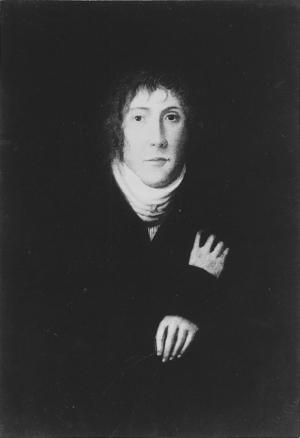Philipp Bozzini
Philipp Bozzini (25 May 1773 – 4 April 1809) was a German physician and inventor, best known for his introduction of the Lichtleiter, a primitive form of endoscope, in 1806. This invention marked a significant advancement in the field of medical diagnostics, allowing for the internal examination of the human body without the need for surgical intervention.
Biography[edit | edit source]
Philipp Bozzini was born in Mainz, Germany, into a family of Italian origin. He pursued his medical studies at the University of Mainz, where he developed a keen interest in improving diagnostic methodologies. Throughout his career, Bozzini was driven by the idea of creating a device that could facilitate the visual examination of internal body cavities, a concept that was revolutionary at the time.
In 1806, Bozzini introduced the Lichtleiter (meaning "light conductor" in German), which is considered the precursor to modern endoscopes. The Lichtleiter was designed to direct light into the body, allowing for the examination of internal organs through a small external opening. This device utilized a candle or oil lamp as a light source, which was reflected into the body through a system of mirrors. Despite its primitive design by today's standards, the Lichtleiter represented a significant leap forward in medical technology.
Bozzini's invention faced skepticism and resistance from the medical community of his time. Many of his contemporaries were unable to see the potential benefits of his device, and he struggled to gain widespread acceptance for his work. Despite these challenges, Bozzini continued to refine his invention and advocate for its use in medical diagnostics.
Philipp Bozzini's contributions to medicine were not fully recognized during his lifetime. He died in 1809 at the age of 35, likely from an infection contracted during his medical practice. It was only in the years following his death that the value of his invention began to be appreciated. Today, Bozzini is remembered as a pioneer in the field of endoscopy, and his work laid the foundation for the development of modern diagnostic techniques.
Legacy[edit | edit source]
The significance of Philipp Bozzini's work has been increasingly acknowledged over time. In recognition of his contributions to medicine, the German Society for Endoscopy established the Philipp Bozzini Medal in 1977, which is awarded to individuals who have made outstanding contributions to the field of endoscopy.
Bozzini's invention of the Lichtleiter has also been recognized as a key milestone in the history of medical technology. It paved the way for the development of sophisticated endoscopic devices that are now commonplace in medical diagnostics and treatment. The principles behind Bozzini's Lichtleiter—directing light into the body to visualize internal structures—remain central to the function of modern endoscopes.
See Also[edit | edit source]
Transform your life with W8MD's budget GLP1 injections from $125
W8MD offers a medical weight loss program NYC and a clinic to lose weight in Philadelphia. Our W8MD's physician supervised medical weight loss centers in NYC provides expert medical guidance, and offers telemedicine options for convenience.
Why choose W8MD?
- Comprehensive care with FDA-approved weight loss medications including:
- loss injections in NYC both generic and brand names:
- weight loss medications including Phentermine, Qsymia, Diethylpropion etc.
- Accept most insurances for visits or discounted self pay cost.
- Generic weight loss injections starting from just $125.00 for the starting dose
- In person weight loss NYC and telemedicine medical weight loss options in New York city available
- Budget GLP1 weight loss injections in NYC starting from $125.00 biweekly with insurance!
Book Your Appointment
Start your NYC weight loss journey today at our NYC medical weight loss, and Philadelphia medical weight loss Call (718)946-5500 for NY and 215 676 2334 for PA
Search WikiMD
Ad.Tired of being Overweight? Try W8MD's NYC physician weight loss.
Semaglutide (Ozempic / Wegovy and Tirzepatide (Mounjaro / Zepbound) available. Call 718 946 5500.
Advertise on WikiMD
|
WikiMD's Wellness Encyclopedia |
| Let Food Be Thy Medicine Medicine Thy Food - Hippocrates |
Translate this page: - East Asian
中文,
日本,
한국어,
South Asian
हिन्दी,
தமிழ்,
తెలుగు,
Urdu,
ಕನ್ನಡ,
Southeast Asian
Indonesian,
Vietnamese,
Thai,
မြန်မာဘာသာ,
বাংলা
European
español,
Deutsch,
français,
Greek,
português do Brasil,
polski,
română,
русский,
Nederlands,
norsk,
svenska,
suomi,
Italian
Middle Eastern & African
عربى,
Turkish,
Persian,
Hebrew,
Afrikaans,
isiZulu,
Kiswahili,
Other
Bulgarian,
Hungarian,
Czech,
Swedish,
മലയാളം,
मराठी,
ਪੰਜਾਬੀ,
ગુજરાતી,
Portuguese,
Ukrainian
Medical Disclaimer: WikiMD is not a substitute for professional medical advice. The information on WikiMD is provided as an information resource only, may be incorrect, outdated or misleading, and is not to be used or relied on for any diagnostic or treatment purposes. Please consult your health care provider before making any healthcare decisions or for guidance about a specific medical condition. WikiMD expressly disclaims responsibility, and shall have no liability, for any damages, loss, injury, or liability whatsoever suffered as a result of your reliance on the information contained in this site. By visiting this site you agree to the foregoing terms and conditions, which may from time to time be changed or supplemented by WikiMD. If you do not agree to the foregoing terms and conditions, you should not enter or use this site. See full disclaimer.
Credits:Most images are courtesy of Wikimedia commons, and templates, categories Wikipedia, licensed under CC BY SA or similar.
Contributors: Prab R. Tumpati, MD



